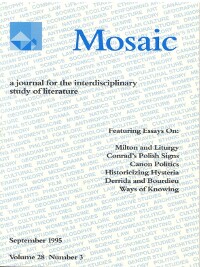Issue 28.3
Overview

General Issue
Published: July 1995
See the issue summary and contents below.
6 essays, totalling 160 pages
$15.00 CAD
This issue of Mosaic contains essays exploring “true religion” and faith in John Milton’s Samson Agonistes, intertextuality and Polish signs in Joseph Conrad’s Nostromo, canon politics and D.H. Lawrence, hysterical personalities in John Fowles’s The French Lieutenant’s Woman, the structure of the bildungsroman in John Irving’s A Prayer for Owen Meany, and a look at challenging ideology in the writings of Jacques Derrida and Pierre Bourdieu.
‘True Religion’ and Tragedy: Milton’s Insights in Samson AgonistesGeorge H. McLoone Reformation allusions in Samson Agonistes are central to Milton’s generic and political characterization of Samson. As a tragic hero, Samson lacks the epic perspective of “true religion.” His renewed cultic strength, unlike Adam’s reformed and visionary empowerment at the end of Paradise Lost, precludes a typology of atonement and parallels the tendency of establishmentarian Christianity to impede rightly informed worship. | |
Twirling Moustaches and Equestrian Statuary: Polish Semiotics in Conrad’s NostromoJean M. Szczypien Through an examination of signifying gestures and literary and pictorial works from Polish culture, this essay explores the way that intertextuality functions in Joseph Conrad’s Nostromo. Particular attention is given to Conrad’s reworking of motifs from the work of the foremost nineteenth-century Polish poet, Adam Mickiewicz. | |
‘Word-perfect but Deed-demented’: Canon Formation, Deconstruction, and the Challenge of D.H. LawrenceIsobel M. Findlay D. H. Lawrence’s critical discourse is reread together with deconstruction in order to rethink canon formation and deconstructive practice. Clarifying the roles of T. S. Eliot and F. R. Leavis in constructing a Lawrence whose challenges to prevailing critical paradigms are muted or distorted, the essay recasts Lawrence as a critic whose activism can help reorient deconstruction. | |
Hysteria, Sexual Assault, and the Military: the Trial of Émile de La Roncière and >The French Lieutenant’s WomanEllen F. Shields This essay examines John Fowles’s The French Lieutenant’s Woman in the light of other male commentaries on the sexual assault trial of La Roncière. Specific focus is on the way that these commentaries attempt to present La Roncière’s accuser as afflicted with hysteria and the way that—despite his attempts to argue that his quintessential woman, Sarah Woodruff, is different—Fowles nevertheless ultimately presents her fascination in terms of character traits associated with hysterical personalities. | |
The Force of Law and Literature: Critiques of Ideology in Jacques Derrida and Pierre BourdieuBarbara Leckie This essay examines the contested terrain of law, literature and social change as it relates to exclusionary practices by turning to the work of Jacques Derrida and Pierre Bourdieu. It argues that their attention to the categories and institutions of law and literature, and to the performative structures and power relations through which these categories and institutions logically cohere, extends the possibility of critiques of ideology. | |
Hero Worship and Hermeneutic Dialectics: John Irving’s A Prayer for Owen MeanyPhilip Page Employing theories of hermeneutics and semiotics, this essay explores the way that John Irving’s novel depicts and undermines seemingly dichotomous ways of knowing. The problem of meaning and the effect of binary thinking are shown to be related to the structuring of the contemporary bildungsroman, gender demarcations, and the search for “fathers” in the post-Vietnam era. |